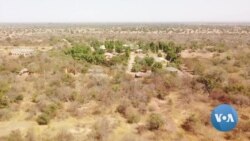Burkina Faso’s opposition has stepped-up pressure on President Roch Kabore to follow through on a one-time campaign promise to allow former president Blaise Compaore to return from exile.
It has been seven years since Burkina Faso’s former president Blaise Compaore fled his compound to Ivory Coast, after a popular uprising against his attempt to extend his nearly three decades in power.
But his Congress for Democracy and Progress or CDP party says their finishing second in November’s election shows support for Compaore — and his return — are growing.
Oumarou Sawadogo, one of more than a million displaced Burkinabes, was driven out of his home by terrorists two years ago and says life was better under Compaore.
He says that when Compaore was in charge, his community never experienced insecurity. For that reason, they believe Compaore’s way of ruling worked and his return could help improve security.
Compaore made neutrality deals with jihadist groups in Mali in return for security at home — deals that were later scrapped.
He committed Burkina Faso to the United Nations peacekeeping mission in Mali, MINUSMA, and was still in power when their troops were for the first time attacked.
Nonetheless, Compaore’s party says negotiations with armed groups need to be revived and he is the one to do it.
“Reason commands us to do it,” says Eddie Kombiego, the new leader of the CDP and Compaore’s political heir. He points out, the country has been attacked for five years by unidentified groups and suggests the first reaction should be to find out who is attacking you and why.
President Roch Kabore’s government last month, for the first time, raised the option of holding direct talks with terrorist groups in parliament, but since then it has become clear negotiations with armed groups have already commenced in the area around the city of Djibo.
Despite a campaign speech that promised Campaore’s return, Kabore’s ruling People's Movement for Progress party, MPP, says it is not guaranteed.
But they say he had better relations with jihadists.
Lassané Sawadogo, the executive secretary of the MPP, says his party has refrained from making direct accusations against anyone with regard to the phenomenon of terrorism. However, they have observed very good relations between certain terrorist groups attacking the country and the old regime, he adds.
Analysts and officials say Campaore’s return could help Burkina Faso’s political reconciliation but are skeptical about the impact he could have on improving security.
Siaka Coulibaly, a Burkinabe security analyst, explains that providing advice to today’s political leader will put Compaore in a very different position to address the issue in comparison to when he was in charge of the country's affairs himself. He thinks Compaore can make a universal contribution in terms of political advice; but, in reality, is not sure he can reverse the trend of violence.
With the scars of his ouster still visible, allowing Compaore to return to Burkina Faso could reopen old wounds.
Officials say he would also have to face justice for the violent 1987 coup that brought him to power. That could be enough of a threat to keep the former president’s house empty.





